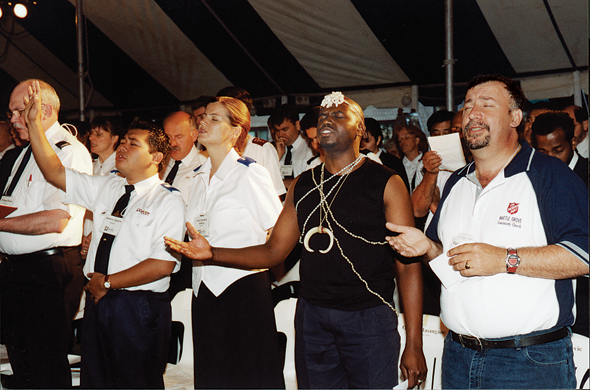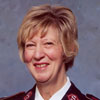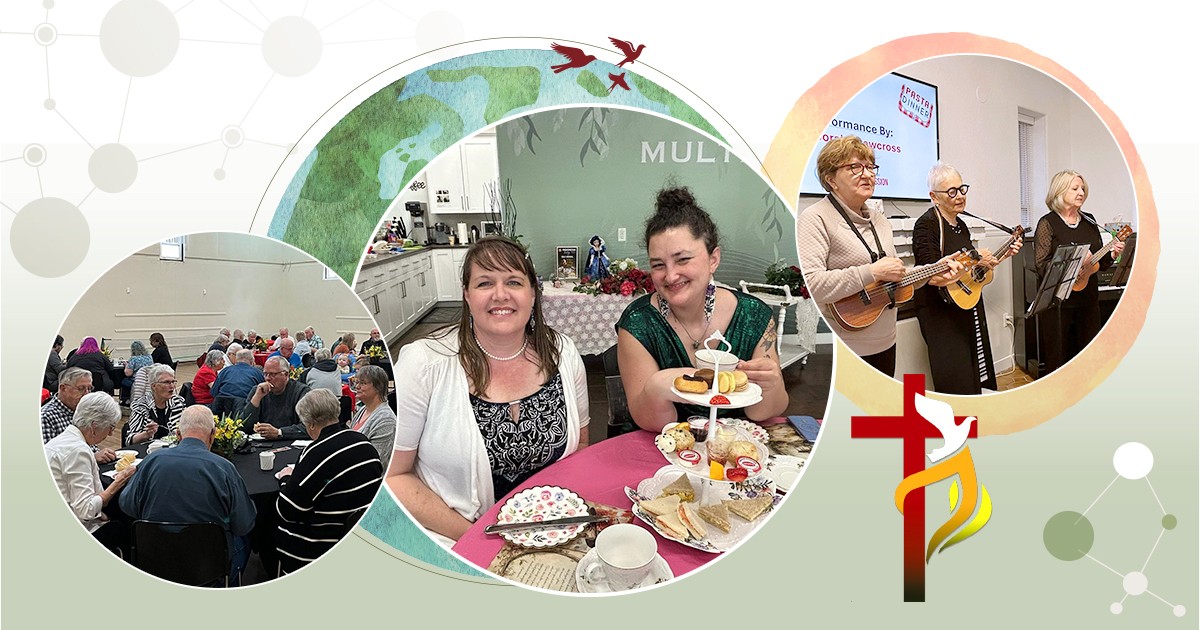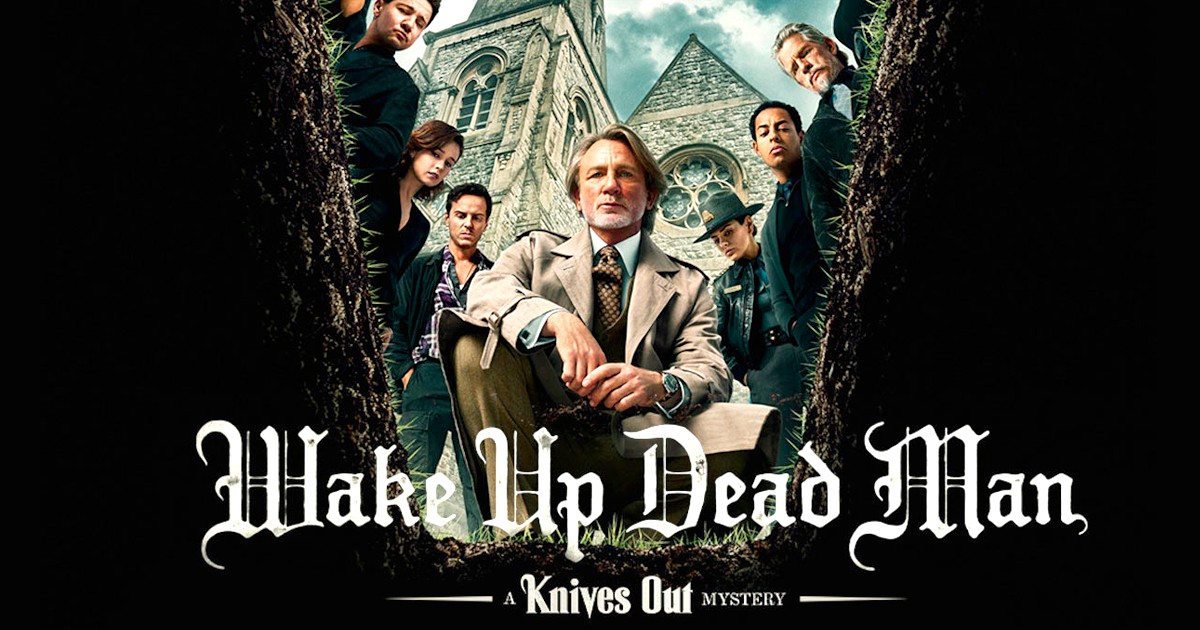 Some years ago my husband, Robert, and I wrote “Revelation Hope – A Worship Experience.” It was our attempt to help congregations move beyond a performance/spectator mentality. It was a cycle of mostly sung worship involving the congregation and musical sections throughout, linked with narrative passages. I remember writing the line: “Any worship in which we engage on earth is but a pale reflection of the worship already taking place in that other realm that we call heaven.”
Some years ago my husband, Robert, and I wrote “Revelation Hope – A Worship Experience.” It was our attempt to help congregations move beyond a performance/spectator mentality. It was a cycle of mostly sung worship involving the congregation and musical sections throughout, linked with narrative passages. I remember writing the line: “Any worship in which we engage on earth is but a pale reflection of the worship already taking place in that other realm that we call heaven.”
It has been a joy for me recently to be caused to eat my own words!
A few weeks ago, we had the privilege of leading worship at Ottawa Citadel, as its musicians celebrated a homecoming weekend as part of the corps 125th anniversary celebrations. Robert and I had been guests there on previous occasions and know something of the rich heritage of that worshipping community. However, we were glad to see the inclusiveness of God's Kingdom now being demonstrated in a fresh new way in the music sections through “participation evangelism” and the intentional mentoring of new members of the congregation who have not been required to “sign on the dotted line” before being allowed to use their musical talents for the glory of God.
A further joy, especially on Sunday morning, was to look out over a truly multicultural congregation and to see that it really did reflect the local community. I remembered that on a previous visit we had chosen that the mostly mono-cultural congregation of that day should sing: “... the black, the white, the dark, the fair, your colour will not matter there; They shall come from the east, the shall come from the west, and sit down in the Kingdom of God.” Now it was happening before our very eyes!
That evening it was our privilege to lead worship in the Gladstone Corps where congregation members were able to enjoy both soul food and body food, and there we remembered: “Both the rich and the poor, the despised, the distressed, They'll sit down in the Kingdom of God. And none will ask what they have been Provided that their robes are clean.”
 The following week we were to be in ministry in Montreal. In preparation for that I had mentally revisited a previous occasion when Robert and I had been part of worship that was a “not so pale reflection.” In June 2004, it was our privilege to convene an International Music and Other Creative Arts Forum (aka MOSAIC) at the Jackson's Point Conference Centre, at which there were 61 delegates from 33 Salvation Army territories in attendance, many from the developing world. We were anxious that those for whom English was not their first language would be enabled to feel at home as quickly as possible. Often singing is a way in which that can happen so we asked God for some inspiration. His answer came in a unique way. He reminded me of a number of worship services in which Robert and I had previously been present where I had had to learn to connect with God while not understanding hardly anything that was being said or sung. The exceptions were words like: Emmanuel, Maranatha, Abba, Hallelujah, Amen. These are Hebrew or Aramaic words that have remained in the original language no matter what version of the Bible one reads, so we wove a very simple chorus around it. We chose the title “Maranatha,” which in the Hebrew has two meanings: Marana'tha (Our Lord, Come) and Maran'atha (Our Lord has come).
The following week we were to be in ministry in Montreal. In preparation for that I had mentally revisited a previous occasion when Robert and I had been part of worship that was a “not so pale reflection.” In June 2004, it was our privilege to convene an International Music and Other Creative Arts Forum (aka MOSAIC) at the Jackson's Point Conference Centre, at which there were 61 delegates from 33 Salvation Army territories in attendance, many from the developing world. We were anxious that those for whom English was not their first language would be enabled to feel at home as quickly as possible. Often singing is a way in which that can happen so we asked God for some inspiration. His answer came in a unique way. He reminded me of a number of worship services in which Robert and I had previously been present where I had had to learn to connect with God while not understanding hardly anything that was being said or sung. The exceptions were words like: Emmanuel, Maranatha, Abba, Hallelujah, Amen. These are Hebrew or Aramaic words that have remained in the original language no matter what version of the Bible one reads, so we wove a very simple chorus around it. We chose the title “Maranatha,” which in the Hebrew has two meanings: Marana'tha (Our Lord, Come) and Maran'atha (Our Lord has come).
I will never forget the first time “Maranatha” was sung by the delegates, as it truly was a foretaste of heaven.
As we travelled the world in the months that followed that conference, we took the chorus with us and I brought home editions in which the few English words that we had used had had French or Spanish written beneath them. Now, as part of the preparations for our recent visit to Montreal, we were able to have our “scruffy versions” professionally translated. What a joy it was to hear the officers on the Spiritual Day sing it in French, and the congregation of Montreal Citadel sing it in Spanish last Sunday, which was Palm Sunday – the beginning of Holy Week.
And as I type this blog, I feel afresh that “not so pale reflection” as my mind goes back to some of the Scripture that I quoted in Revelation Hope years ago that really does paint a picture of the hope made possible by Good Friday and Easter Day:
After this I looked and there before me was a great multitude that no one could count, from every nation, tribe, people, and language, standing before the throne and in front of the Lamb. They were holding palm branches in their hands. And they cried out in a loud voice:
“Salvation belongs to our God,
who sits on the throne,
and to the Lamb.”
(Revelation 7: 9, 10 NIV)
Will you be in that picture? If you will, I invite you to join with me and say: “Amen. Come, Lord Jesus“ (Revelation 22:21).
Photos taken from the MOSAIC forum held in 2004.
 Colonel Gwenyth Redhead is a retired Salvation Army officer. She and her husband, Robert, have held a wide variety of appointments in the United Kingdom, Canada and New Zealand. However, her passion has always been to encourage others in creative responses to God through writing of scripts, stories, articles and lyrics (mostly to Robert's music). She has two daughters, Joanne and Corinne, and rejoices that they, too, use the creativity God has given them in ministry.
Colonel Gwenyth Redhead is a retired Salvation Army officer. She and her husband, Robert, have held a wide variety of appointments in the United Kingdom, Canada and New Zealand. However, her passion has always been to encourage others in creative responses to God through writing of scripts, stories, articles and lyrics (mostly to Robert's music). She has two daughters, Joanne and Corinne, and rejoices that they, too, use the creativity God has given them in ministry.









Marinus Huizinga
Salvation Army
Delfzijl
Holland.